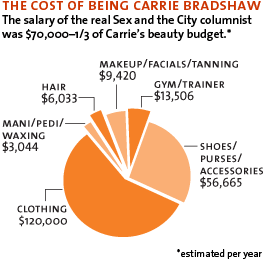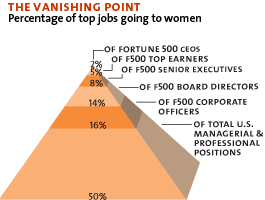Women make 80¢ on the male dollar, even accounting for time off to raise kids. If that factor is not accounted for, women make 56¢.
Over her career, the average working woman loses $1.2 million to wage inequity.
Since 1963, when the Equal Pay Act was signed, the wage gap has closed by less than half a cent per year.
In 1963, RFK withdrew his nomination to a club that had spurned a black official and formed a club that didn’t admit women.
3 board members of Catalyst—a workplace-equity advocacy group—belong to Augusta National Golf Club, which bans women.
One is the CEO of GE, which won a 2004 Catalyst Award, although the company has a below-average rate of female executives.
Companies with women in top jobs see 35% higher returns than those without.
74% of female executives have a spouse who’s employed full time. 75% of male execs have a spouse who’s not employed.
42% of female execs over 40 don’t have kids.
For full-time working fathers, each child correlates to a 2.1% earnings increase. For working moms, it’s a 2.5% loss.
Every industrialized country except the U.S. and Australia has paid parental leave with a guaranteed job on return to work.
86% of guests on Sunday-morning political talk shows are men. So are 80% of the guests on The Daily Show.
Only 5 of 20-odd “thought-leader” magazines have ever had a woman as editor-in-chief. Two of those jobs were held by Tina Brown.
Only 24% of recent works in The New Yorker, the Atlantic Monthly, Harper’s, Vanity Fair, and the New York Times Magazine were written by women, according to WomenTK.com.
1/3 of those were articles on gender or family or were short stories or memoirs.
41% of Mother Jones’ writers during the same period were women. This issue only 11% are.

Magazines that run lists of “best” firms for women to work for often accept pay-to-play advertising or use self-reported data. Working Mother lists firms facing class-action suits for sex harassment and pregnancy discrimination.
Working Mother recently found Allstate, American Express, and General Mills among the 8 best firms for women of color. At each, 30% of new hourly hires are women of color, but 0% of newly hired executives are.
Women over 65 are almost twice as likely to be poor as men.
Actresses over 40 account for 9% of movie roles. Actors over 40 account for 30%.
Anne Bancroft was 36 when she played Mrs. Robinson in The Graduate. Dustin Hoffman was 30.
Chances that a Best Actress winner portrayed a prostitute, a nun, or a mute: 1 in 8.
Since orchestras started requiring musicians to audition behind screens, the number of women hired has increased 20%.
40% of married professional women feel their husbands do less work around the house than they create.
Each teenage girl increases a mom’s weekly housework by 1.5 hours, but leaves a dad’s unchanged. A teenage boy adds 3 hours to mom’s chores, and an hour to dad’s.
Heavyset women get fewer promotions and face more job discrimination. Heavyset men do not.
Models weigh 23% less than average women. In 1986 it was only 8% less.
The above statistics were quoted in a press release for a Dove product whose adcampaign uses full-figured models but the use of which is claimed to reduce cellulite.
Asked to pick a partner for a relationship, college men tend to choose women in subordinate jobs. College women show no preference, nor, for a one-night stand, do men.
Men only earn 3/4 as many B.A.s as women. Some colleges now admit to practicing affirmative action for male applicants.
Only 1/3 of female Ph.D.s who get on the tenure track before having a baby ever do so.
31.5% of Iraq’s parliament are women. Only 15% of the U.S. Congress are women.
15 African nations have a higher percentage of female legislators than does the U.S.

69% of men believe America would be better off if women occupied more top political jobs. Only 61% of women agree.
Among Republicans, that split is 52% to 34%.
Under Bush , the Labor Dept. has eliminated 25 publications on pay inequity and child care.
After a woman filed a sexual-harassment complaint against her Merrill Lynch superior, he circulated an article titled “Stop Whining,” which warned that “constant complaining can cost you your job.”

















